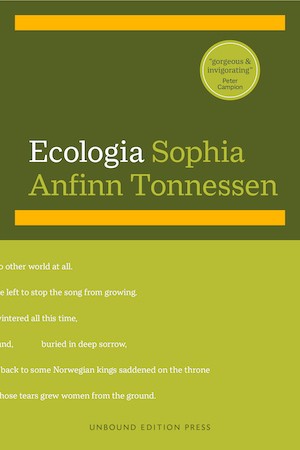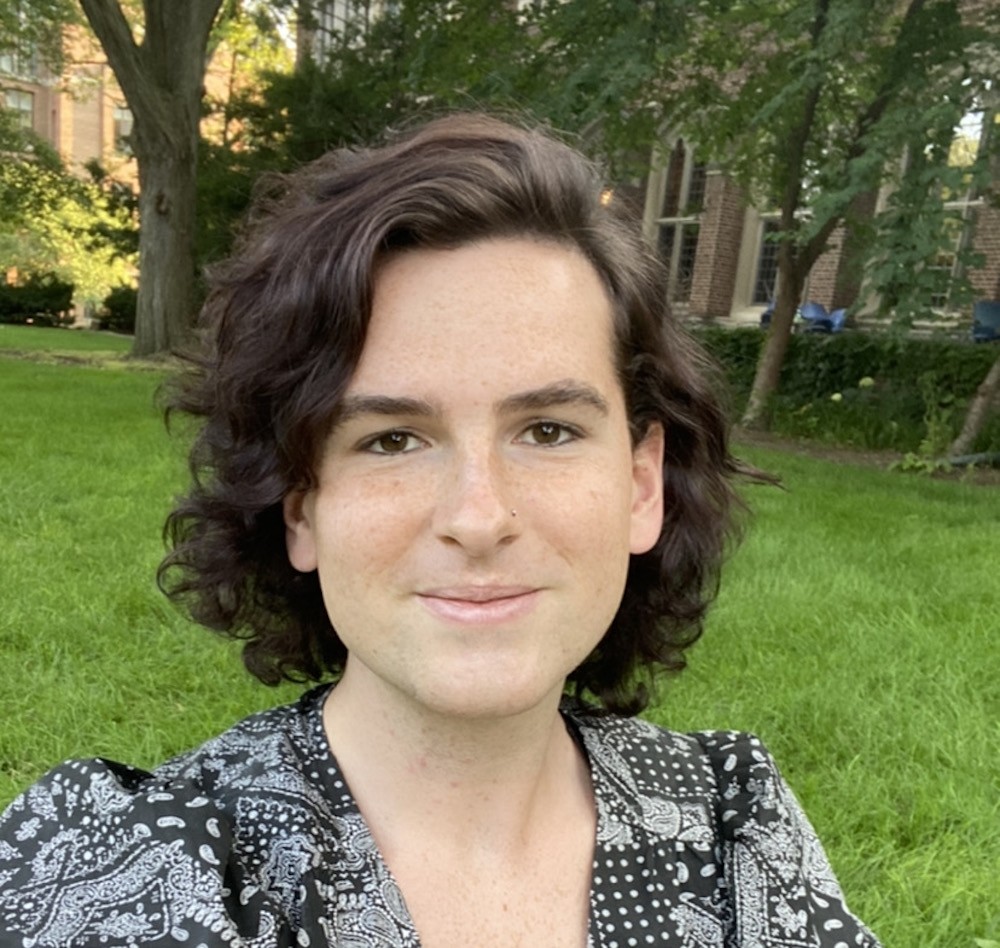Undergraduate Writing Alumna Sophia Tonnessen ('19 CC) Publishes 'Ecologia'
Ecologia by Undergraduate Writing alumna Sophia Tonnessen (‘19 CC) will be published by Unbound Edition Press on October 12, 2021.
The debut poetry collection features experimental forms, such as long poems and intentional repetitions, and explores the intersections of gender, identity, and memory. Tonnesson, who is transgender, conveys the “intense undeniability of an emerging self searching for a new ecology, both biological and political.” Ecologia also delves into subjects ranging from Carol Baskin in Tiger King to jokes about porn to puns that are terrible by design. With poems that transform bodies, texts, memories, and flowers, Tonnessen’s collection is full of wonder and mystery, and also highlights courage, strength, and faith in the self.
Writer Peter Campion writes of Ecologia in a review, "With passion and precision, ardor and humor, Whitmanian exuberance and Dickinsonian canniness, Sophia Anfinn Tonnessen’s Ecologia springs up from the 'wounded place' that is also 'holy ground.'”

School of the Arts alumna and Tonnessen’s former professor Carey McHugh ’06 also praises Ecologia, stating that the collection “chronicles a transformation, a translation of energy and spirit within the force and fragility of the physical body.”
Tonnessen's poem "Layaway" recently placed second in the 2021 Sappho Prize by Palette Poetry. The prize is open to women poets nationwide and judged by Maggie Smith.
Sophia Anfinn Tonnessen is a PhD Pre-Candidate in Slavic Literature at the University of Michigan, and graduated with a BA in Creative Writing from Columbia University. Her work has been published in Poet Lore and in several online journals. Tonnessen lives with several hundred books and one neglected houseplant.
We talked with Sophia Anfinn Tonnessen about Ecologia below:
Tell me more about the process of writing Ecologia?
All of the poetry in Ecologia is from the start of lock-down up until nine or ten months in—March or April of 2020 up to January this year. In the beginning of lockdown, I experienced what I’m sure a lot of writers experienced, which is a complete inability to write anything...I got pretty frustrated with that and stopped writing for a few weeks. One day, I sat down and wrote this three or four page poem that eventually became one of the centerpieces of the book, called “Lockdown,” in a very different style from what I’ve written before. I’m not really sure where it came from, but that was the start of this process for me.
Did the book evolve over the course you were writing it, or did you know what you wanted it to be about from the beginning?
I had a pretty clear sense as soon as I wrote the title poem “Ecologia” in May or June of last year. I felt like I really had a sense of intersecting ideas of transformation and the body and the memory and relationships coming together that forms this ecology in the sense of personhood. I was also thinking at the time about transition, and I had come out to my therapist as transgender a few months before that, so that started to work its way into the book as well and become much more explicit as I became more comfortable talking about myself and my identity. It became not just about my memory and identity as the person I had been, but also how I was transforming into the new person I wanted to be and I could be comfortable living as.
What drew you to ecology as a subject in your poetics?
I think that very often in studying literature in both undergrad and as a graduate student, the framework we’re using to address any idea—philosophical, sociological—is binary. So we’re moving between two opposing poles and you have to choose which one of those two things a work adheres to or an author believes in. I just so desperately wanted an idea that isn’t about that, because as I was transitioning and thinking about myself differently, I didn’t feel like I was moving from one pole to another. It felt like I was receiving this feedback from the world and growing and putting things back out. It was much more a series of relationships and a network between all of these things, rather than choosing between one thing and another.
I like that a lot—ecology as a framework—because it speaks to all of these elements that compose of the self and interact with the self. I also love this quote by Carey McHugh about your book: “Tonnessen does not spare us the brutality of rebirth but allows relief in detailing the humor, the eroticism, and the ordinary, delicate beauty of this life.” Can you talk more about the humor in particular and how you see it operating in Ecologia?
I’m so grateful to Carey for writing that for me. She was my first creative writing professor at Columbia and I definitely think of her as a mentor and it means the world to have her write something so generous about my book. I would say that humor is, in person, one of my main modes of interacting with the world. I think that’s true with a lot of people who need humor to deflect from their emotions. I just don’t see humor very often in poetry or contemporary poetry—it feels very narrow in terms of its emotional range when it comes to joy or humor, or these more positive emotions. There’s a lack of balance there. I felt like if I wanted to be honest about who I was, I needed to correct that balance in my own writing. I had written these dramatic, hand to the forehead, sigh poems, and it just felt tired, almost.
How did you utilize humor as an act of balancing?
I think it’s a form of honesty about myself—that I’m not just experiencing these dramatic changes and feeling these huge feelings, I’m also just cracking stupid jokes and making puns, like this is part of my life too and I want people to see that. Especially when I think for a lot of people, this will be one of their first experiences reading or thinking about a trans author’s work, just because it’s really hard for gender non-conforming people to find a place in the publishing world. In thinking of myself as a representative of my community, I didn’t want it to just be about the painful parts of my life, I wanted to represent myself as a complete person so that people who know me through my poetry will see me that way.
Ecologia is available for pre-order now.
